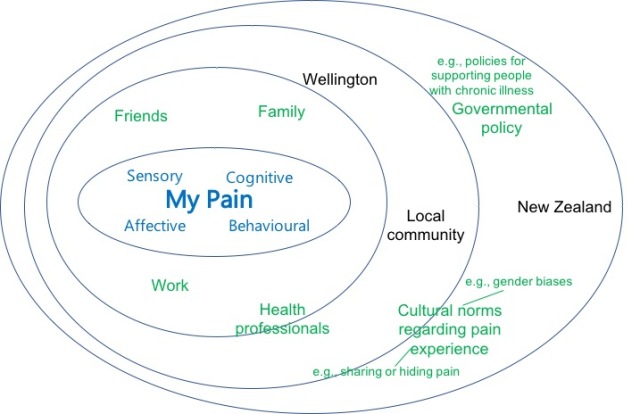The hardest thing about my ongoing pain is the recurring thought that I am a burden. It’s taken me over a month to write this post. That’s how hard it is to even think about, even now when most of the time I don’t have thoughts that I am a burden.
When my pain is at its worst and I can’t do anything else except lay in bed, that’s when I feel like a burden. When I can’t spend time with my family or friends, when I can’t cook or clean or do washing, when I can’t work; I start to think about how useless I am, how I don’t help with anything or contribute, that I am a burden.
Feeling like a burden is overwhelming, I’d do anything not to feel it. So, I used to try to hide my pain, to push it away even from myself. Never ask for help until I was too unwell to do anything for myself.
The people who love me have never made me feel like a burden. The number of times I have actually been made to feel like a burden are few. So why do I get these thoughts?
For me, I think partly my character and partly society drive this recurring thought.
Character wise, I’m a perfectionist. I put a lot of pressure on myself. When I was first in the pain management programme, I was resistant to the suggestion that I could relax the demands I make of myself. My healthcare team gave me journal articles to read about perfectionism and chronic pain to help me see the link between my expectations and my pain (they learned an effective way to get through to me pretty quickly!).
Society wise, we are a ‘productive’ culture. You are seen to be succeeding when you contribute to society by working, by looking after yourself and your family. There is a stigma around not being a productive part of society.
I’m going to refer back to an image from my last blog showing my pain in a biopsychosocial model (described fully in Sad, not happy):

Another aspect in the widest circle are cultural norms and stigma regarding how we see those who need support in our society. I see these norms and stigma every day in my life, for example in the limited support we give to those who cannot work for various reasons (even in New Zealand with a history of relatively good social support), the attitudes towards people who need support, even the language we use about the cost of chronic illness1 and metaphors in our day-to-day language (e.g., “pull your weight). All this information reinforces the perfectionist in myself and on bad pain days I can feel like a burden again.
These days, when I have good self-management techniques, the thought never lasts for long, but can you imagine how crushing it is to feel even for a short period of time?
I know I’m not the only person with chronic illness to feel this way2. It is important to recognise the link between thoughts and pain, as in the biopsychosocial model, because these thoughts don’t exist apart from the pain; they are associated with increased pain.
The point of sharing that I sometimes feel like a burden, is to make this aspect of chronic pain a little more visible.
You see, I’m not a burden. Even when I can’t help out, or need to cancel plans, or need time off from work, I’m still a valued person who brings a lot of joy to my family and friends. I just need support sometimes. If more people understood what life was like for those with chronic pain (and illness more widely), that we are just ordinary people who need support. Not burdens on our family and friends, or society. Then this recognition might begin to reduce the stigma in society and the pressure on the thinker of the b word.
Auckland University of Technology (AUT) is currently running a project called “Stigma: How Does it Affect People with Chronic Pain?”. If you experience chronic pain, please consider participating. It is an online survey and takes approximately 30 minutes. I’m going to participate now: https://aut.au1.qualtrics.com/jfe/form/SV_3Ia4KppeaE5LHN3
- https://www.ncbi.nlm.nih.gov/pmc/articles/PMC1183496/ : “Chronic diseases impose an enormous financial and societal burden on the United States”; http://www.ahdbonline.com/articles/2003-socioeconomic-burden-of-chronic-pain : “Chronic pain is a debilitating condition that is associated with significant medical, emotional, and economic burdens.”
- Kowal, J., Wilson, K. G., McWilliams, L. A., Péloquin, K., & Duong, D. (2012). Self-perceived burden in chronic pain: Relevance, prevalence, and predictors. Pain, 153, 1735–1741. https://doi.org/10.1016/j.pain.2012.05.009

So true. And we make ourselves sicker by trying so hard to “pull our weight” and do what we feel needs to be done and then… the crash.
Xx
LikeLiked by 1 person
It’s so easy to forget our pacing plans, isn’t it! Xx
LikeLike
Powerful stuff. There are often things in these blogs that wake me up to things about my own behaviour that had gone unnoticed.
LikeLiked by 1 person
Thanks Alan, it’s a different point of view and the lived experience right? Your eyes open to the same world that is experienced so differently, to the extent that it is almost a different world. I get challenged to think about my thoughts and behaviours in worlds I was not aware of too when I read other people’s writing.
LikeLike
Pingback: My brain closet is full – Pinches of Pain blog
Pingback: Chronic mess? – Pinches of Pain blog